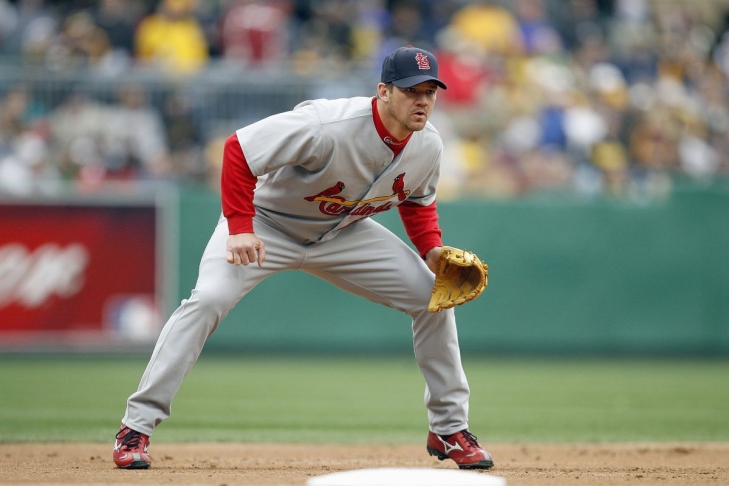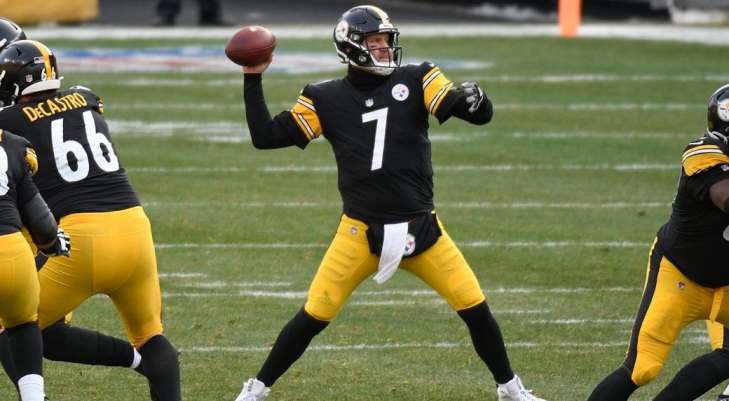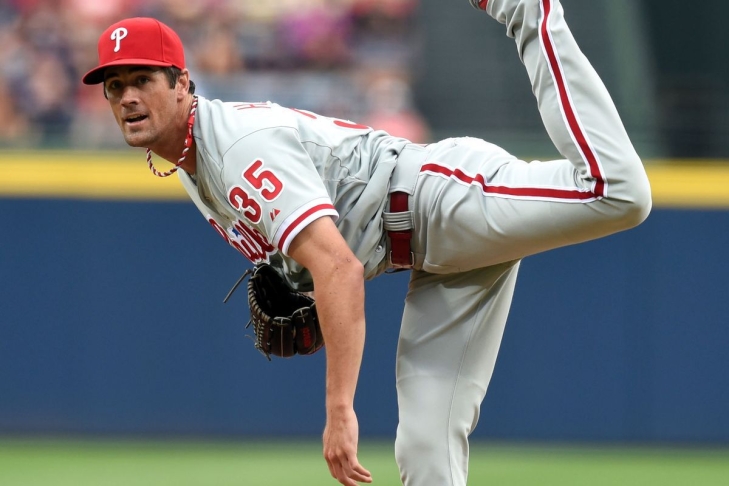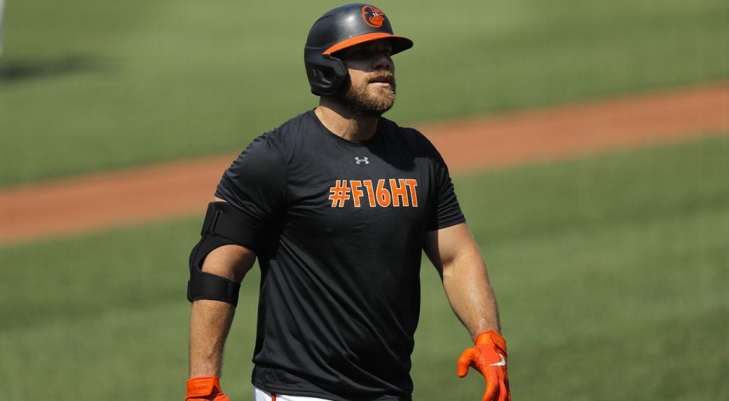
Committee Chairman
The 2023 Baseball Hall of Fame Ballot is out!
The ballot is now official!
The Baseball Hall of Fame has announced the 24 men who comprise the ballot for their 2023 Hall of Fame Class.
To make the Hall of Fame, the former player must obtain at least 75% of the vote from the voting body. If a player has at least 5% they can remain on the ballot for the following year, however, a candidate can only stay on the ballot for ten years.
First, here are the returning candidates:
Scott Rolen is the highest returning candidate. Rolen was fourth in voting last year, with David Ortiz, Barry Bonds and Roger Clemens finishing ahead of him. With Ortiz elected, and Bonds and Clemens aging off the ballot, Rolen has an excellent chance to crack 75 percent, which is possible based on last year’s 63.2. This is his Rolen’s sixth ballot and he is ranked #34 on Notinhalloffame.com.
Todd Helton was sixth in voting last year, behind the above four discussed and Curt Schilling, who like Bonds and Clemens, have also aged off the ticket. The career-Colorado Rockies star, is on his fifth ballot, and it would not be a big surprise if he makes the leap needed from 52% to make it to Cooperstown this year. Helton is ranked #11 on Notinhalloffame.com, and is the second highest ranked player on our list on this ballot.
Billy Wagner has been steadily climbing and last year he broke the 50% plateau with 51. The top closer on this ballot, Wagner might not make the jump to 75, but he could be the biggest beneficiary of the clearing of Bonds, Clemens and Schilling. He is ranked #41 on Notinhalloffame.com.
Andruw Jones enters his fifth ballot, and like most, is coming off his highest vote tally, a 41.4% finish in 2022. The long-time Brave Outfielder, had less than 10% in his first two years, and if he gets in one day, it will be one of the most dramatic vote elevations in Hall history. Jones is ranked #38 on Notinhalloffame.com.
Gary Sheffield is running out of time on his ninth ballot, and while he has the stats, he is under a PED cloud. He did break 40% last year (40.6), giving some hope. Sheffield is ranked #22 on Notinhalloffame.com.
Alex Rodriguez is the most controversial person on the ballot, as he WAS suspended for PEDs, but it is still one of the most accomplished baseball players that ever lived. A-Rod debuted last year with 34.3%, but what do you with someone who echoes those you kept out? Rodriguez is our highest ranked player on the ballot at #3.
Jeff Kent is in the “now or never” year with his tenth and final appearance on the ballot, and though his 32.7% in 2022 was his highest, it was only marginally better than 2021’s 32.3%. It does not look good for the former MVP, who will likely have to hope for a Senior ballot, which even then, he might not make. Kent is ranked on Notinhalloffame.com at #50.
Manny Ramirez, who like Rodriguez has the stats but the PED suspension is on ballot number seven. The former Red Sox star had 28.9 percent last year, which while it is highest total, it is not much better than the 23.8% he had on his first try. Ramirez is ranked #9 on Notinhalloffame.com.
Omar Vizquel plummeted to 23.9% after domestic violence allegations emerged, and that is his LOWEST tally over his five years on the ballot! This doesn’t happen, especially considering he was over 50% two years ago. This could be the biggest drop off of any legitimate Hall of Fame contender regardless of the sport. Vizquel is ranked #49 on Notinhalloffame.com.
Andy Pettitte continues to cling to life on the ballot, entering his fifth year, with a 10.7% last year. He is ranked #39 on Notinhalloffame.com.
Jimmy Rollins returns to his second ballot, after a 9.4% finish last year. He is ranked #110 on Notinhalloffame.com.
Bobby Abreu has not done well on the HOF ballots, but he is still here! Finishing with 8.6% last year, he has yet to have a double-digit vote percentage, but is still alive. He is ranked #77 on Notinhalloffame.com.
Mark Buehrle enters his third year of eligibility but has never breached double digits on a Hall of Fame ballot. The Pitcher had 5.8% last year and is ranked #79 on Notinhalloffame.com.
Torii Hunter is also in his third year on the ballot, and like Buehrle, he has not reached 10 percent as of yet. Hunter is ranked #194 on Notinhalloffame.com.
Here are the first ballot entrants:
Bronson Arroyo: Arroyo played 16 seasons, most notably with the Cincinnati Reds where the Starting Pitcher was an All-Star in 2006. He was also a member of Boston’s 2004 World Series winning team, and he had a lifetime record of 148-137 and 1,571 Strikeouts. Unranked on Notinhalloffame.com.
Carlos Beltran: Beltan is the strongest first ballot candidate by far, with a resume of 435 Home Runs, 2,725 Hits and a bWAR just over 70. A nine-time All-Star, two-time Silver Slugger and Rookie of the Year, Beltran won a World Series in his swansong season in 2017 with Houston, but was also saddled with a cheating scandal for that win that cost him a managerial job with the Mets.
Matt Cain: Cain had a career record of 104-118 who went to three All-Star Games and won two World Series Rings in a career spent entirely with San Francisco.
R.A. Dickey: Dickey won the NL 2012 Cy Young with the Mets and the knuckleballer had 120 Wins against 118 Losses.
Jacoby Ellsbury: Ellsbury won two World Series Rings with the Red Sox and was a one-time All-Star at Centerfield. He had 1,376 Hits.
Andre Ethier: Ethier played his entire career with the Dodgers, going to two All-Star Games, while adding a Silver Slugger and a Gold Glove. He had 162 Home Runs with 1,367 Hits.
J.J. Hardy: Hardy went to two All-Star Games, was a Silver Slugger and was a three-time Gold Glove. He belted 188 Home Runs with 1,488 Hits.
John Lackey: Lackey won three World Series Titles with three different teams (Los Angeles AL, Boston & Chicago NL) on his way to a 188-147 record with 2,294 Strikeouts.
Mike Napoli: Napoli won a World Series Championship with the Red Sox in 2013, was a one-time All-Star and smacked 267 Home Runs.
Jhonny Peralta: Peralta was a three-time All-Star infielder who accumulated 1,761 Hits and 202 Home Runs.
Francisco Rodriguez: Rodriguez won the World Series in an electric playoff with the Angels before he was technically a rookie, and he would later be a six-time All-Star and three-time Saves leader. He had 437 career Saves.
Huston Street: Street was the 2005 American League Rookie of the Year and the closer would also go to two All-Star Games. He had 324 Saves.
Jared Weaver: Weaver went to three All-Star Games and had a 150-98 record with 1,621 Strikeouts. He twice led the AL Wins, and played all but one season with the Angels.
Jayson Werth: Werth was on Philadelphia’s 2008 World Series Championship Team and was an All-Star the year after. He had 229 Home Runs with 1,465 Hits.
The following names who were eligible for the first time this year, were not included:
Erick Aybar
Joaquin Benoit
Joe Blanton
Jonathan Broxton
Stephen Drew
Jason Grilli
Adam Lind
Aaron Hill
Ubaldo Jimenez
Glen Perkins
Chad Qualls
Carlos Ruiz
So, who is going to get in!!!
You know that we will be paying attention, and we are excited to see how this pans out.
Our 2027 Football Futures section is now up!
It is onward and upward at Notinhalloffame.com where we have a new add-on to our Football Futures, those who are eligible in 2027.
Those players are:
Alejandro Villanueva: A two-time Pro Bowler at Left Tackle, Villanueva played most of his career with Pittsburgh.
Alex Mack: Mack played at Center where he went to seven Pro Bowls, which he had at least one each for all three of the teams he played for (Cleveland, Atlanta & San Francisco). He was also a three-time Second Team All-Pro.
Andrew Whitworth: Whitworth had one of the better second half careers of any Offensive Lineman, where the Left Tackle went to four Pro Bowls, earned two First Team All-Pros, and in his finale, won the Super Bowl with the Rams and Walter Payton Man of the Year.
Ben Roethlisberger: “Big Ben” was the consensus Rookie of the Year, and would lead Pittsburgh to two Super Bowl Titles. A six-time Pro Bowl Selection, Roethlisberger is in the top ten all-time in Pass Completions, Passing Yards and Touchdown Passes.
Brandon Brooks: Brooks went to three Pro Bowls and the Right Guard won a Super Bowl Ring with the Eagles.
Emmanuel Sanders: The Wide Receiver had a good career where he went to two Pro Bowls and won a Super Bowl with Denver.
Eric Weddle: Weddle returns to the futures after a brief, yet fruitful comeback with the Rams, winning the Super Bowl. The Safety led the NFL in Interceptions in 2011, went to six Pro Bowls and secured two First Team All-Pros.
Joe Haden: Haden had 29 INTs in a career split between Pittsburgh and Cleveland, where he was a three-time Pro Bowl Selection.
K.J. Wright: Wright was a Pro Bowl Linebacker in 2016 and would win a Super Bowl Ring with Seattle.
Malcolm Jenkins: Jenkins was a three-time Pro Bowl Safety who won two Super Bowls, one with New Orleans and one with Philadelphia.
Ryan Fitzpatrick: The journeyman Quarterback had flashes of brilliance over his career and was 10 Yards shy of 35,000 over his career.
Ryan Kerrigan: Kerrigan played most of his career with Washington and was a four-time Pro Bowl at Linebacker.
Sam Koch: Koch played his entire career with the Ravens where the Punter went to the 2015 Pro Bowl, won a Super Bowl, and finished his career seventh in Punting Yards.
The entire 2027 list can be found here.
As always, we here at Notinhalloffame.com would like to thank you for your support, and we encourage you to give us your opinions and cast your votes.
70. Cole Hamels
A master of the changeup, Cole Hamels was in the hunt for an extended period of time as one of the top southpaws in Baseball.
Hamels was taken in the First Round of the 2002 Draft (17th Overall) by Philadelphia, and he worked his way to the rotation in 2006 with a decent rookie year (9-8, 4.08 ERA). The southpaw went to his first All-Star Game as a sophomore (15-5. 3.39 ERA) while also securing his first of four top-ten Cy Young finishes. There was no All-Star for Hamels in 2008, but that was likely his most fulfilling season in Baseball. Hamels had another good year, acing the Phils to the World Series, where he won both the NLCS MVP and World Series MVP. It looked like he was destined for stardom, but perhaps it was just meant to be "very good."
The Phillies made the 2009 World Series, but Hamels struggled. Hamels was still a solid player, but with the addition of Roy Halladay in 2010, he was no longer considered the top hurler. He rebounded in 2011, going to his second All-Star Game, and in 2012, he had his best individual campaign with career-highs in Wins (17) and Strikeouts (216). Hamels was again an All-Star and a top-ten finish for the Cy Young.
He had his last strong year in Baseball, earning a fourth and final All-Star year in 2016 (15-5, 200 SO), but by the following year, he was beset with shoulder problems. He dropped to the middle tier of Pitchers over the next two seasons, and with Philadelphia dropping out of contention, he was dealt to the Texas Rangers during the 2015 Season. After two ineffective years, he was traded to the Chicago Cubs, but his decline was in full swing. He signed with Atlanta in 2020, but injuries held him to one Game.
Leaving Baseball after 2020, Hamels had a lifetime record of 163-122, 2,560 Strikeouts with a bWAR of 59.0. That is good, but is he Hall of Fame worthy? A win for Hamels might be surviving the first year on the ballot.
Chris Davis
You can't talk about Chris Davis without discussing the spectacularly good and the abysmally bad. Over the last half of his career, no other baseball player may have gone from one extreme to the other quicker than the former First Baseman.
Davis came up through the Texas Rangers system, and the scouting reports about the First Baseman never changed: Low Average, colossal power, lots of Strikeouts, and slow. He made the Rangers roster first in 2008, but he bounced up and down from Texas and Triple-A often in his first three years, though he did prove he could go deep against Major League pitching. He was traded to Baltimore during the 2011 Season, and it was in Maryland where he showed the best and worst of what he could do.
Davis had his first 30 Home Run year in 2012 (33) and did so with a solid .270 Batting Average. He then joined the 50-Home Run Club in 2013, winning the Home Run Title (53) and RBI Title (138), and batting a career-high .286. Davis was third in MVP voting, went to his only All-Star Game, and captured his only Silver Slugger. He was third in MVP voting, but there were still a lot of doubt in his overall game.
Davis belted 26 Home Runs in 2014 but batted less than .200. The following year, he won his second Home Run Title with 47 Home Runs, but he also led the league in Strikeouts (208). He again was the infamous first-place finisher in whiffs in 2016 (219), but his Home Run tally dropped to 38, and he batted .221.
Power and Average dropped afterward, and Davis infamously set the MLB record for the longest streak without a Hit (54 At Bats). He morphed into a chronically hurt player, who could not hit, let alone for power, and he limped into retirement after the 2020 Season.
Davis was much-watch television every time he batted, but two Home Run Titles can not negate a bWAR that is barely over 11. He will get on the ballot but will be fortunate to gain a vote.





